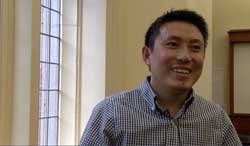Filed Under > Convocation
An Observer from Shangri-La
Sonam Tobgye came to TC to help Bhutan modernize its education system. He's discovered that there's plenty worth preserving, as well
Sonam Tobgye came to TC to help Bhutan modernize its education system. He’s discovered that there’s plenty worth preserving, as well
The Kingdom of Bhutan, a tiny Himalayan country of fewer than 1 million people, has been called “the last Shangri-La.” Located between India and China, this mostly Buddhist and Hindu constitutional monarchy remained nearly untouched by the West until the 1960s – and though poor by Western standards, its inhabitants have an outlook that Sonam Tobgye, who is receiving his master’s degree in science education this spring, describes as “knowing the limits of our desires – being content with what we have.”
Yet In the 21st century, Bhutan, known as one of the world’s happiest nations, cannot afford to remain completely impervious to change. As in many developing countries, its leaders want to educate future generations to be more creative, independent problem-solvers and innovators who can enable the country to play catch up, in a very short space of time, on the march of centuries.
That, in a microcosm, was the challenge facing Tobgye himself when he arrived in New York City in fall 2010. Sent on scholarship by Bhutan’s Royal Education Council, he had been teaching at a K-8 school in an area remote even by Bhutanese standards.
“There was no blacktop on the road, and we were shut in by frequent landslides,” recalls Tobgye, who had trained in Bhutan to teach high school biology and chemistry, but who found himself teaching all sciences at every grade level in the school. “We had no electricity for months at a time. And then in the space of a week I went, literally, from the forest to the world’s most metropolitan city. It was crazy. I had never seen buildings higher than six stories before.”
Even harder for Tobgye, who had left behind his wife and three-year-old son, was the shift in social mores. “In Bhutan, people are very social, and it’s very easy to make friends,” he says. “When we see a stranger, we say hello. But here, where there are so many people, everyone is so busy yet so isolated.”
With his natural gregariousness, and having studied English all his life, Tobgye – the son of a librarian and a farmer -- has adjusted quickly. Meanwhile, at TC, he has worked steadily on the mission that brought him here: learning research methods to determine how well new teachers are implementing the ideas and standards put forth in preparation programs, particularly in the context of state science standards. With his advisor, O. Roger Anderson, Tobgye has carried out a small-scale but intensive study of preservice science teachers at TC, conducting descriptive statistical analyses of their practices through survey questionnaires, lesson plans, and the work of their students and other materials. Because those standards are not always easily quantifiable, the work involves parsing “performance indicators” specified by teachers set in their daily lesson plans.
“Perhaps a preservice teacher will say, ‘in this lesson I will address inquiry,’” Tobgye says. “But if the performance indicator they specify is that by the end of the lesson, students will be able to use a formula to solve questions, then there’s a gap. They’re not doing inquiry – they’re going right to traditional forms of instruction.” Critical analysis of lesson plans and the work of pupils can provide deeper insight into the gap between conception and implementation of standards, Tobgye says.
In fact, the study by Tobgye and Anderson has honed in on just this kind of problem, finding that preservice teachers are conceptually in sync with the ideas they have been taught, but often missing the mark when it comes to implementation. And that, of course, is the challenge Bhutan faces as it attempts to shift from a highly structured, top-down reform and teacher centered teaching to a more flexible, student-centered approach.
When Tobgye returns home this fall, he will use the research methods he has learned at TC to pinpoint where the new model may be breaking down. One theory he has already developed: that better modeling of teaching methods during teacher preparation could improve implementation. “My conjecture is that is in preparing preservice teachers, we need to do a better job of showing them how standards are used in real-life situations,” he says. To that end, he hopes to help Bhutan set up more classroom apprenticeships that resemble the field placements TC arranges for its preservice teaching students.
Tobgye says he will miss the United States. He has enjoyed living in a country that is “so on top of technology – when something new is developed, you are the first to adopt it” – and that he views as “a pioneer in human development.” At the same time, he has come to understand the pressures of consumerism. “It’s not good to always want the newest thing,” he says. “Today, you have a Range Rover, but tomorrow you want a Mercedes Benz. Then you can never be happy.”
Published Monday, May. 14, 2012
